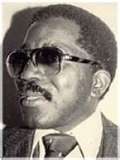POET’S PROFILE
But Mtshali was a dreamer. He continued to war in his mind the injustices of the system in which he was born. His poetry borders on the survival of a people and the hope that tomorrow will bring. His commentaries were sometimes of the despair of a people who doubtless continued to protest. His great poem, “Amagoduka at Glencoe Station” closes with these epic lines:
“We’ll return home
to find our wives nursing babies-
unknown to us
but only to their mothers and loafers.”
This explains the disruption of family life and with it, identity, which was one of the trademarks of the apartheid era.
The beauty of Mtshali’s poetry is that though he wrote about serious issues, his lines were comical, humorous and sometimes, careless of the consequences. That was a subtle way of saying the most difficult things and getting the desired impact. He has been tagged as one of the most influential black South African poets of all time.
JUST A PASSERBY
I saw them clobber him with kieries,
I heard him scream with pain
like a victim of slaughter
I smelt fresh blood gush
5 from his nostrils,
and flow on the street.I walked into the church
and knelt in the pew
“Lord! I love you.
10 I also love my neighbour. Amen”I came out
my heart as light as an angel’s kiss
on the cheek of a saintly soul.
Back home I strutted
15 past a crowd of onlookers.
Then she came in –
my woman neighbour:
“Have you heard? They’ve killed your brother.”
“O! No! I have heard nothing. I’ve been to church.”
REVIEW
This poem is a sarcastic statement of the helplessness of black South Africa under the apartheid regime. The story is almost unbelievable but is not surprising, with the knowledge of Mtshali’s style. The poet narrates his witnessing of the clubbing of a man to death. He uses the word “clobber” (line 1) which is a more savage form of “clubbing.” Knobkieries or kieries, as he uses here, are huge clubs that are used for defence across East and Southern Africa.
The first six lines are gruesome narrations of a slaughter scene. The clobbered man is here representing the rights of the black race in the apartheid regime apparently beaten to death. But nobody can talk about it. He is said to scream with pain/ like a victim of slaughter (lines 2-3). He bleeds from his nostrils (line 5), representative of all the blood that was shed in apartheid South Africa.
But the poet just passes by, helpless.
He walks into a church. This cowardly act of unconcerned piety reflects the total failure of the passivity that apartheid-era religion offers. Religion is a means of escape and under its purported shade, the poet can declare: “Lord I love you…”(line 9). Love is a high contrast to the emotion that courses through his veins. He feels anger and hatred but in the church, he leaves all those emotions outside. “…I also love my neighbour. Amen” (line 10) is the phrase that reinforces his denial.
Now, the poet leaves the church …heart as light as an angel’s kiss/ on the cheek of a saintly soul… (lines 12-13). His conscience is cleared and he struts home. Strutting is walking with kingly poise and haughty carelessness. Past the spot of death and with others looking on, he walks home, not even stopping. Does he not care? He does. But in apartheid South Africa, where the life of a black man means less, survival overrides sympathy. Even brotherly sympathy! So it is of no consequence when his woman neighbour comes in to tell him of the death. Of no consequence to him but to our shock when we find out that it is his brother who was clobbered!! … “Have you heard? They have killed your brother” (line 18).
Mtshali is a master. The poet just answers, in unbelievable self-denial: “I have heard nothing. I’ve been to church” (line 19). This last line opens the eye to the horror of apartheid and makes us appreciate the work of Mandela and all those who fought for the end of the system. This last line enforces Mtshali as a master.


